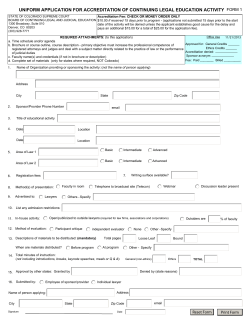
RO YA L CO
ENGAGEMENT SELF-ASSESSMENT & GAP-ANALYSIS REVIEW ACCREDITATION STEP STEP STEP STEP STEP STEP Department fills in the registration form which can be downloaded from the website. ACSA team sets up informal (optional) teleconference to discuss details, practicalities and concerns or issues arising. 3 Once the department meets the majority of the Priority 1 ACSA standards, and are ready to officially engage, the department is invoiced for services (Priority 1 standards are those that must be achieved in order for accreditation to be awarded). On receipt of payment, agreed term of engagement begins. 4 Department completes self-assessment and works to close the gaps between current practice and the required standards with the help of an assigned College Guide who is a clinical expert provided by the College. 5 Once department assess themselves as compliant with 100% of the Priority 1 ACSA standards, they request an on-site review. The review team comes to visit the department. 6 When 100% compliance with Priority 1 standards is confirmed by onsite review team, and after any recommendations are implemented, the department is awarded with an accreditation plaque. PEER REVIEW FOR QUALITY IMPROVEMENT Department agrees to engage with ACSA. A ‘lead’ is appointed to act as the main point of contact with ACSA team. 2 CC A 1 ROYAL C O CONTACT TISTS HE ST INTERNAL DECISION GE OF ANAE E LL R E D I TAT I O N ANAESTHESIA CLINICAL SERVICES ACCREDITATION (ACSA) Improving quality in anaesthetic services What is ACSA? Why does it matter? Anaesthesia Clinical Services Accreditation (ACSA) is a voluntary scheme for anaesthetic departments in the UK to formally and actively demonstrate their commitment to high quality service provision and improvement. The ACSA accreditation process provides clinical directors, managers and medical staff the opportunity to benchmark their service against existing national standards and provides them with the necessary support to achieve any unmet standards. It is based on a set of standards selected from the Guidelines for the Provision of Anaesthetic Services (GPAS) recommendations. ACSA works with the department leadership to ensure that all members of engaged departments are actively involved in meeting standards recognised by their peers, and are committed to improvement through establishing an action plan. The standards focus on the following areas: Care Pathway; Equipment, Facilities and Staffing; Patient Experience and Clinical Governance. The scheme has been developed by the Royal College of Anaesthetists (RCoA) Clinical Quality Directorate and offers departments quality improvement through peer review. Reviews are undertaken by senior doctors from within the speciality who know what to look for in service delivery, thereby enabling positive change. ACSA standards are based on GPAS recommendations. These standards are reviewed annually to remain up to date with current best practice in anaesthesia. What does it mean for my department? ●● The ACSA process is a partnership between the College and departments in the pursuit of quality improvement ●● It provides a benchmark to identify areas for improvement, and to create a better working/teaching/learning environment for staff and better services for patients ●● The CQC has stated that it regards accredited departments as low risk As a marker of quality, accredited departments will become more attractive to trainees/employees. Associations are already being made between delivering a high quality service and providing high quality training. Patients will also be assured that they are receiving outstanding service. If you would like any further information, or if you have any questions, please contact the RCoA directly at acsa@rcoa.ac.uk or 020 7092 1697. ‘I strongly support the work on accreditation being undertaken by the Royal College of Anaesthetists. The ACSA accreditation programme should in due course be a very useful source of information on the quality of anaesthetic service for the Care Quality Commission.’ Professor Sir Mike Richards, Chief Inspector of Hospitals, Care Quality Commission ‘Engaging in the process and working together for a common purpose has boosted department morale and team spirit. The peer review process has led to our going over every aspect of our service with a fine tooth comb. We can confidently evidence a high quality service and care for our patients.’ Dr Sade Okutubo, Clinical Lead in Perioperative, Critical Care & Chronic Pain Services, Homerton Hospital ‘This is a very positive step in the continuous movement to improve the safety of anaesthesia. The opportunity to share best practice and learning through the ACSA library is also to be commended and is supportive of Don Berwick’s ambition for the NHS to be a system devoted to continual learning and improvement of patient care.’ Dr Mike Durkin, National Director of Patient Safety, NHS England
© Copyright 2025








![National University Virtual High School [2014-2015]](http://cdn1.abcdocz.com/store/data/000348438_1-3a80ae3134ab49395c6a7578fe5bdf0b-250x500.png)


